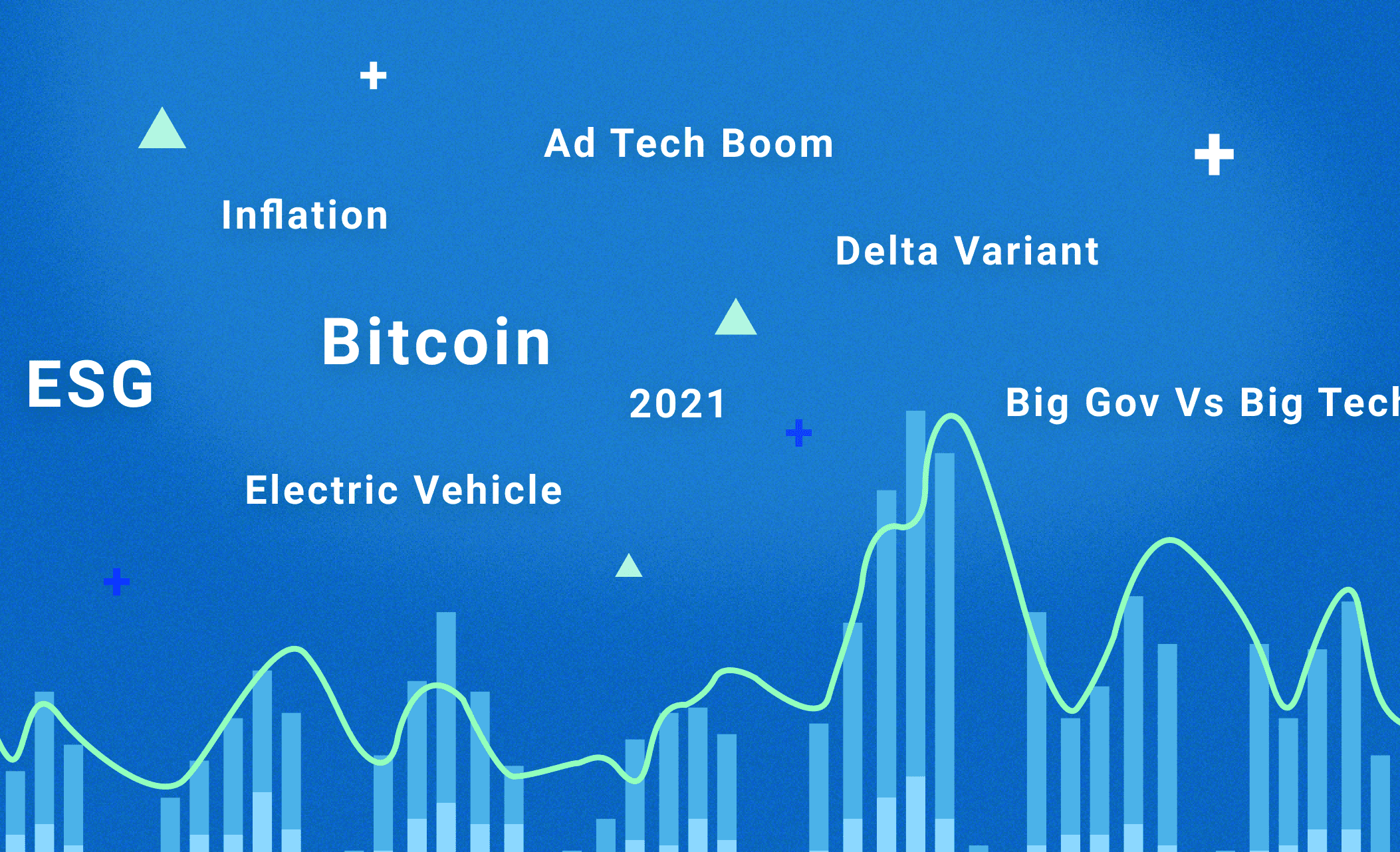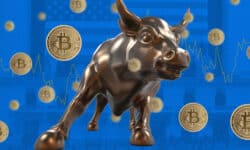Industries and markets have been undergoing dynamic and monumental changes even before the COVID-19 pandemic hit. When we look at market-impacting trends, we think of them as the ways potential market-moving events impact businesses. Markets are very volatile, and business trends are often shaped by fast real-time events and behavior.
If 2020 was a year of rapid response to unprecedented times, 2021 was a year of transition. 2021 was less about the “new normal” and more about pondering the “next to normal”. Barring any unexpected catastrophes, businesses (and society) started to look forward to shaping their futures rather than just grinding through the present.
As we mentioned in our blog, The top 34 AlphaSense searches of 2021, we had the unique opportunity and privilege to help our clients get the most out of AlphaSense during continuously uncertain times and thus, gain a unique perspective on what different clients were searching and monitoring for. From the surge in electric vehicle sales all the way to companies’ responses to the Capitol riots, those searches informed much of the market trends we tracked and followed throughout the year.
We offer you a roundup of the top business trends from 2021 and their potential market impacts moving into 2022.
1. ESG and Sustainability Investments are Booming
In Q2 2021, the keyword “sustainability” and all corresponding synonyms (example: ESG, governance, risk, etc.) appeared 4,692 times in earnings calls. Sustainability mentions in quarterly earnings transcripts went up 44% since 2018 and up 30% YoY. It’s clear that C-Suite leaders are feeling the pressure to deliver meaningful ESG strategies in 2022 and beyond. We partnered with SAP in our latest report, ESG and Sustainability Trends in C-Suite in 2021, and dug into transcripts from quarterly earnings calls in AlphaSense to better understand the ESG topics that are top-of-mind for C-Suite in 2022.
2. Digital Transformation Explodes in Investment Banking
Digital transformation, long-emerging, has officially arrived in investment banking. Driving this transformation is the power of data analytics and artificial intelligence, giving institutions more information and insight (and doing it more quickly and intelligently) than ever before. We pinpointed 5 clear trends emerging.
3. Infrastructure Stocks Likely to Get a Boost From Build Back Better
Now that Congress has passed the $1 trillion infrastructure bill, the U.S. is ready with picks and shovels to break ground. And that’s excellent news for infrastructure stocks. While many initiatives in this bill won’t kick in for a few years, there is great potential for a number of infrastructure stocks to see a boost.
4. EV Battery Surge Causes Lithium Supply Chain Issues
The age of the electric car is here. That means that the demand for lithium batteries is here to stay, as the need for electric vehicles (EV) and energy storage grows with leaps and bounds. However, the limited number of qualified lithium producers in the EV battery manufacturers’ supply chain has challenged the surging demand. What is the US doing in order to keep up?
5. Green Building Transforms the Real Estate Industry
In real estate, ESG is taking the form of investment in green buildings — buildings designed and constructed to reduce or eliminate adverse impacts and increase the positive impact on the environment. What do real estate investors think about the trend? How does green building affect returns and profitability? One thing is clear: it’s here to stay.
6. Ad Tech’s Latest Consolidation Wave
It’s been eight years since the last ad tech bubble ballooned, then burst. Not only are ad tech companies red-hot with investors, but they’re also gaining steam amongst one another. As a result, deals are being cut left and right at an unabating pace. What’s driving ad tech’s latest consolidation wave?
7. Business Restrictions Tighten Amidst Delta Variant
The U.S. government may not require that everyone get the vaccination but still, dozens of businesses across corporate America establish vaccine and mask mandates for some or all of their workers. In the wake of the uptick in Delta variant cases, some are restoring mask requirements for customers, others are delaying plans to bring workers back to the office, and several have even imposed vaccine mandates.
8. Long-term Bond Market Downward Trend Mystifies Experts
As the economy went into overdrive, the long-term bond market went right along with it. After a spring season of upward trajectory and anticipated continuation of the trend, the swift downturn on long-term treasury bond yields during the summer months stumped strategists.
9. Big Government vs. Big Tech
In June, House lawmakers unveiled their most ambitious move against tech giants yet. They proposed five bills designed to rein in Big Tech and loosen their grip on digital industries. Ultimately, regulation takes time and a lot of hearings to bring about tangible results. But the goal isn’t necessarily to pass a law. Instead, Congress can use these hearings as a bully pulpit in order to push towards self-regulation.
10. Increase in Q2’s Capital Good Orders Impacts Business Investments
New orders for primary non-defense capital goods rose 0.8% — from $255.5 billion in May to $257.6 billion in June. Core capital good orders or durable goods (those that are not aircraft or defense-related) act as a proxy for better understanding business investments.
11. COVID-19 Vaccine Inequality Risks a Halted Recovery
The success of vaccine distribution has not been universal. With the initial doses being first delivered en masse to countries like the United States, the United Kingdom, and the United Arab Emirates, vaccine disparities between wealthier nations and the developing world raged on and halted global efforts to stop the virus’s spread.
12. The Impact of Bitcoin on Financial and Government Institutions
What will the impact of Bitcoin on financial markets and institutions around the world be? The honest answer: experts don’t know yet, but some implications are becoming apparent as an investment in Bitcoin grows and its perception around the world evolves.
13. Higher Labor Costs and the Consumer Discretionary Sector
The demand for the consumer discretionary sector has returned to pre-pandemic levels. However, employees have been hesitant to come back to work, whether a company has increased wages or not. While the higher wages benefit workers, higher labor costs come with consequences for employers in the form of narrower profit margins and missed sales due to staffing shortages.
14. Rainbow Capitalism Amidst Pride Month
While Pride Month is a time to celebrate the LGBTQ+ community and all the rich brilliance and life it has breathed into the world, rainbow capitalism continues to fight for the spotlight in the larger queer narrative. Are companies putting their dollars where their mouths are or are they using their rainbow logo as a trojan horse for monetary gain?
15. Oil & Gas Stocks See Momentum From ESG
The hyperfocus on ESG issues in public and the investment industry has created a platform for oil and gas companies to highlight their ESG efforts and impact. ESG initiatives, when implemented effectively, create a win-win scenario where companies are making a positive impact on the world while also increasing efficiency, profitability, and attractiveness to potential investors.
16. IRC 280e and the Cannabis Market
While marijuana proponents across the United States are singing the praises of tax surpluses and their ability to directly benefit from a multitude of state-based initiatives (specifically state public school funds), there remains several federal laws and tax codes spurring chatter amongst cannabis companies – most notably the IRC 280e.
17. Market Analysis on the Cost of Inflation
As the stock market continued to rollercoaster through the first half of 2021, inflation remained a looming issue on the minds of many analysts, brokers, researchers, reporters, the media, and companies.
18. The Global Chip Shortage’s Impact on the Semiconductor/Automotive Industry
Semiconductor chips, used in everything from cars, intelligent fridges, smartphones, and computers, are notoriously difficult to make. Due to the global pandemic, a shortage of materials used in making them spurred worldwide supply-chain issues.
19. The Winners and Losers from The Suez Canal Crisis
The Suez Canal, a major pathway among the world’s shipping routes, was blocked by a major container ship, the Ever Given. Despite the short-lived block, there were immediate after-effects. Who were the winners and losers?
20. Larry Fink’s 2021 Letter to CEOs
BlackRock CEO and Founder Larry Fink released his 2021 Letter to CEOs, accompanied by BlackRock’s 2021 Client Letter. Echoing sentiments from 2020, this year’s letter is an urgent message to address climate change, social justice, and data disclosure.
21. Large Cap Companies Ramp Up Climate Commitments
According to The Carbon Majors Database, 100 of the world’s largest companies have been responsible for 71% of global GHG emissions since 1998, a leading cause of global warming. Of that exact total, 32% of all emissions come from public investor-owned companies. To better understand how corporate teams adapt to a world now focused on ESG, we compiled a list of 20 large-cap companies that have shared their climate commitments.
22. Companies Respond to the Capitol Riots
After the violent insurrection at the U.S. Capitol, corporates distanced themselves from Donald Trump and his GOP allies. Some of the biggest names in the business – from big banks like Goldman Sachs and JPMorgan to consumer brands like Coca-Cola and Target – all took a stand against lawmakers by suspending campaign donations.
Looking to follow the latest global market-impacting events and stay ahead of the curve? We’ve got tips and takeaways you can use in our white paper, Four Ways to Approach Market Impacting Events.



